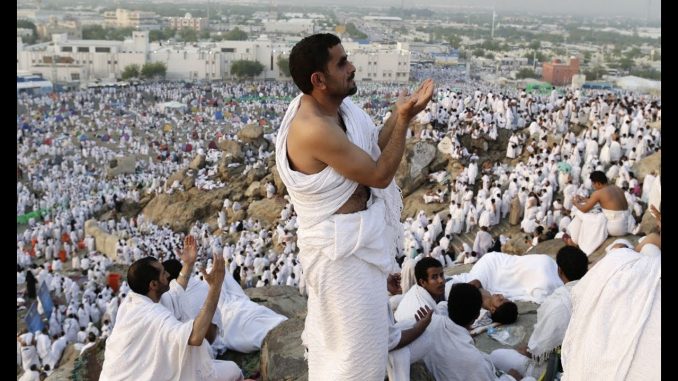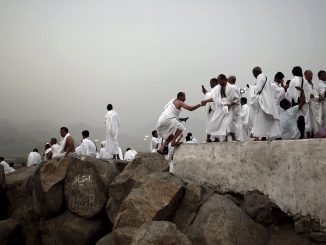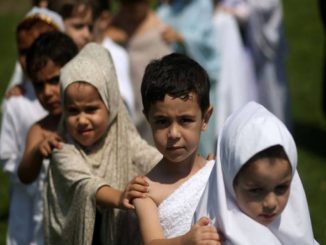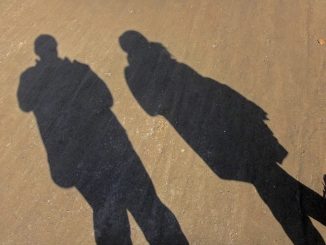
A Report on the issues of Hajj
By Sheikh Khalid Bin Abd Al Aziz Al Hueiseen
Compiled by: Abu Mujahed Al Maziani
Restriction to be observed during Ehram :
1- The meaning of the restrictions that must be observed during Ehram is what is one who is performing Haj or Ummrah prevented to do (during the status of Ehram). However, such restrictions are originally Halal but only made Haram during the Ehram period. Again we must emphsis here that status of Ehram is not merely putting on the required dress but rather taking the intention of Ehram (Niyah).
2- According to scholars, they identified restrictions of Ehram as 9 according to the relevant texts:
3- Hair removal: Here it includes removing or cutting hair using any type such as cutting, pulling, or burning.
4- Hair here includes all the hair of the body: head, moustache, beard, hands, legs, chest and other.
5- They agreed that one who had to shave all or part of his hair for a legitimate excuse such as infection with lice or any other kind of harm may do so and make a ransom based on the hadeeth narrated by Ka`ab may Allah be pleased with him and reported in both Bukhari and Muslim.
6- A number of scholars such as Hanbali school saw that the pulling of one hair required paying a sadaqa to one poor person, two hairs requires two Sadaqas, three for three. Whereas 5 hairs and more require making a ransom. They defined a Sadaqa as giving the quantity of a hand full or a little more of food to a poor person. However, the confirmed opinion is that a ransom is not required except in the case of shaving most of the hair.
7- The other opinion is that in case of removing 1 or 2 hairs, nothing must be given out. It was confirmed that the Messenger salla Allah A`alyhee wa sallam had a cupping therapy, which involves some hair removal, while he was in Ehram and did not make a ransom neither did he instruct of doing so. But if one preferred willingly to make a Sadaqa he may do so.
8- Automatic (not induced) hair falling from any part of the body does not involve any responsibility and thus nothing is required to make it up.
9- One may scratch his/her hair during Ehram even if hair falls, which does not require any making up for what falls in such case is dead hair only.
10- One may also softly comb hair.
11- One is not obliged of a ransom in case forced to shave. Other wise if not forced a ransom is required.
12- Nail cutting or trimming is not allowed during Ehram. As defined: cutting is to cut or remove the tip of the nail
13- Trimming is removing the sides of the nail.
14- In case the nail is cut on purpose one must give a Sadaqa to 1 poor person, 2 poor persons for 2 nails and so forth.
15- In case the nail fell unintentional, one is not required for making up.
16- In case the nail partially broke while it hurts the person, the person might remove without responsibility.
17- We don’t have a confirmed evidence (daleel) taken after the Messenger salla Allah A`alyhee wa sallam regarding the ransom for a nail cutting. But rather scholars established it in simulation with the hair shaving.
18- One who is unable to pay a ransom for a nail cutting is excused.
19- No ransom or Sadaqa is required in case the nail was cut by force.
20- The rule applies for hand or feet nails.
21- One is allowed to cut the nail of a 6th finger or toe without any responsibility.
22- Using a head cover for men (that directly touches the head) such as the turban, head cap or any other garment. The rule is taken after the hadeeth of the Messenger salla Allah A`alyhee wa sallam when a man in Ehram was hit by his she camel, he said: “Do not cover his head”. However, placing one or both hands over the head is not considered covering.
23- A man may carry over his head a water sack or container in general. He may also use a piece of cloth as protection between his head and the container.
24- A man in Ehram is allowed to take shade under a tent, sail, car or the like according to the Sunnah.
25- A man in Ehram is not obliged for a ransom in case he found his head covered upon waking up, but rather just removes the cover.
26- Also no ransom is required in case he forgot and covered his head even multiple times.
27- Rules regarding the hair, nail cutting and head cover applies for male and female children respectively.
28- Men are restricted during Ehram to wear tailored garments.
29- In case the man can not find Izar (cloth to wrap around the waste) he may use pants till he finds one then take it off immediately without a ransom.
30- A man must not use the kind of footwear that covers above the heels.
31- A man is not allowed to wear socks. However, he may use other forms of cover but without making them take the shape of socks.
32- One is allowed to place a bandage over the hurt in his foot or finger.
33- One is allowed to use pants in cases of certain diseases that affect the private parts and require covering. But still must pay a ransom by virtue of the hadeeth narrated by Ibn Ka`b may Allah be pleased with him and reported in Bukhari and Muslim.
34- But if it is a wound, he may use a bandage without having to pay a ransom.
35- In case a man suffers incontinence of urine, he is allowed to place a piece of cotton or cloth over his private part. In such case a ransom is not required.
36- In case the man had to fully cover his private part, still shall not be held a responsibility of a ransom.
37- Using perfume over the body or head is not allowed.
38- In case one forgets and uses perfume must only wash it three times according to the Sunnah based on a hadeeth reported by Bukhari :” Wash it three times”
39- It is not recommended to smell perfume and other scented material except for saffron and basil. It is only Makrouh (not recommended) to deliberately smell perfumed or scented items.
40- In case the Izar or Reda-a were touched with perfume, they must be washed.
41- According to some scholars it is not recommended to sit over a perfumed place as long as nothing can stick to the Ehram clothes. Better yet not to.
42- One may kiss the black stone while it is perfumed. This is not considered a violation of Ehram restrictions.
43- It is better not to use perfumed detergents such as the soap. Yet it is not a restriction.
44- In case one who is intending the Ehram used perfume prior to getting into the status and some perfume remained on his/her body, head or flowed over his/her forehead, may only wipe it off without responsibility.
45- However, if the perfume flowed after getting into Ehram to the body, in this case a ransom is required because it takes the ruling of one who used perfume.
46- Earth hunting is restricted such as deer, rabbits and all other animals that are Halal for hunting are restricted during Ehram.
47- But fishing is allowed during Ehram. Scholars differed regarding the killing of lotust. But refraining from killing it is better.
48- However, one may kill any animal that attacks and harms him/her even during Ehram.
49- According to Sunnah through authentic hadeeth, one is permitted to kill five things:
50- A Crow, mouse, kite, mad dog, scorpion which are all harmful creatures that are to be killed during or outside of Ehram.
51- A gecko is to be killed if it harmed.
52- Scholars differed regarding killing the lion, tiger, wolf and the like during Ehram in addition to the above mentioned five creatures. The conclusion is to kill them if attacked and harmed.
53- But as for the Sunnah is to only be restricted on killing the 5 creatures.
54- It is forbidden to conclude marriage contract during Ehram without a ransom.
55- Concluding a marriage contract is the only item among the Ehram restrictions that does not require a ransom.
56- The contract that is concluded during Ehram is invalid.
57- Intercourse is forbidden during Ehram and here an intercourse means the actual insertion of a man’s organ into a woman’s vagina. In case a man only placed his organ between a woman’s legs or thigs, or had the wife masturbates for him, all these acts are not defined as intercourse.
58- Scholars are consensus about one who copulates after taking the intention and before going to A`rafa that the Haj is corrupted or invalid. Only copulation among Ehram restrictions invalidates Haj. However, he must continue his invalid Haj. In case it was the Fard Haj, one must make it up. Other wise if it was voluntary Haj, it must not be remade.
59- In case copulation occurred after the first Tahalul (releasing the Ehram), Haj remains valid. Yet both the man and woman must give a ransom (a sacrifice of a she camel).
60- Both couples must immediately leave the location.
61- The husband must assume the financial responsibility.
62- As for copulation after A`rafa but before breaking the Ehram, scholars are different. The majority go for the invalidation of Haj and thus must follow the above mentioned rules. While there are some who see it valid but with a sacrifice of she camel for each of the couple.
63- Touching the flesh between a husband and a wife is forbidden during Ehram including a kiss, and a lustful touch that require a ransom. Yet the Haj remains valid. Imam Ahmed may Allah have mercy on him said if one toched his wife’s private parts while in Ehram, he must make a ransom.
64- One who is intending to perform Haj or Ummrah must keep on remembering Allah and making Istighfar (dhikr and saying Astaghferullah Alazeem) throughout the time of ritual, refrain from looking at Haram, backbiting, and enjoin what is good and forbid what is bad.
65- One who is in Ehram is allowed to use the following:
66- To bath at all times according to the Sunnah.
67- Scratch the hair.
68- Softly comb the hair.
69- Use non perfumed oils or cream.
70- Use perfumed soap better yet not to use it.
71- Wear rings and watches.
72- A woman may wear rings, bracelet, necklaces during Ehram.
A Report on the issues of Hajj
Tags :



